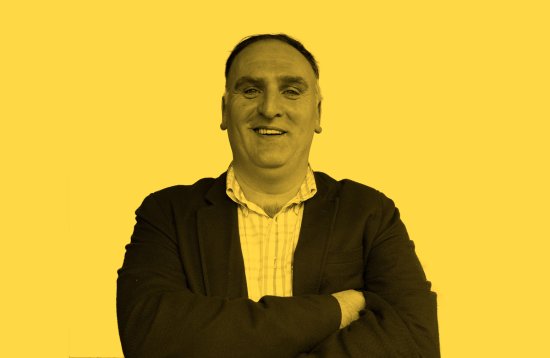
In Haiti, we’re teaching cooking skills, building businesses and supporting communities
When I arrived in Washington, D.C., in 1993, I was a young and ambitious chef with a dream to share my native Spain with America. To do it, I had to open a restaurant serving a cuisine no one knew anything about, in a pretty rough neighborhood of D.C. Cooking had been my only education up until this point, and despite the odds, I knew that with enough drive and determination, we could be successful. When I look back on this younger version of myself, I smile thinking of what the meaning of success was to me.
Fast-forward more than 20 years later, and the meaning of success has evolved to include more than a singular restaurant. In those 20 years, I met my wife and became the father of three beautiful daughters. The Spanish restaurant I was opening, Jaleo, was not only successful—it became the first of four that would join the Penn Quarter community, that once rough neighborhood which is now one of the most energetic parts of the city. Those restaurants would become the building blocks to my company ThinkFoodGroup, which continues to grow and create opportunity for thousands of people.
[time-brightcove not-tgx=”true”]
I met my friend Robert Egger of D.C. Central Kitchen and L.A. Kitchen, and he taught me how to empower communities—how helping those in need is about more than just throwing money at a problem, but about investing in the right solutions. In 2010, I traveled to post-earthquake Haiti and saw first-hand that food does have the power to change the world. I started my nonprofit, World Central Kitchen, in 2012 to provide smart solutions to hunger and poverty. Living this lesson has allowed me to discover Haiti—the culture, food and invincible spirit of the Haitian people.
The Haiti I’ve found is devoid of the devastation or desperation that is often depicted in the news. It’s home to an incredible group of people who are proud of their country and their culture. Filled with pristine coastlines, lush forests and bustling metropolises, Haiti is an adventure waiting to happen. In a single day there, I’ve swam in a spectacular waterfall deep in the jungle, enjoyed incredible, authentic Haitian food on the streets of the historic artisan city, Jacmel, and have lounged on a perfect beach where there wasn’t another person in sight. The Haiti that I have discovered has so much to offer, and yet the rest of the world knows so little about it.
Haiti is ripe for exploration, but even more so, it needs our help. I started World Central Kitchen because after traveling to post-earthquake Haiti, I saw that in order to make a positive impact on its communities, we needed to give relief by showing up, and creating sustainable solutions that would keep working long after the relief aid had left.
For us, that meant teaching people skills that would help them get jobs and give back to their communities. It meant educating people on clean cooking alternatives so that they stopped threatening their lives every time they tried to put a meal on the table. It meant creating synergies with businesses like the Boulanjri Beni Sustainable Bakery and Pwason Beni Fish Restaurant that we helped open, synergies that in turn train the community in cooking management, create jobs and generate revenue. We are investing in a brighter future for Haiti. The work we are doing there isn’t about building walls, it’s about improving the betterment of people’s lives in their own communities so that they don’t need to look for a better world somewhere else.
And now it’s time for all of us to invest in Haiti. I want to show people a different side of this country, a side that they will want to visit for themselves. That’s how we can really make a positive impact and move Haiti into the future, by showing up, traveling to their beautiful country, spending our money there and improving their economy, all while setting off on an exciting adventure.
Haiti was one of the first places where Christopher Columbus landed in 1492 and is the only place in the world where slaves overthrew their masters. It has amazing landmarks, like the Citadelle Laferrière in Cap-Haitien, a stunning fortress resting high up in the mountains that is an icon of freedom. And it has unbelievable food—a remarkable mix of African, French and Spanish influences. There is always something delicious to taste, from deep fried patties in the street, to the classic breakfast drink, Akasan, made of corn and coconut milk.
This is the real Haiti, the Haiti that I know, and if the rest of the world were able to see it, tourists would visit, businesses would invest and there would be change. It will be a story of success, and all I ask is that you’ll join me.
José Andrés, a TIME 100 honoree, is a chef, activist and creator of the documentary Undiscovered Haiti.
